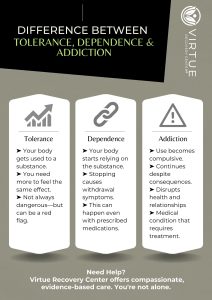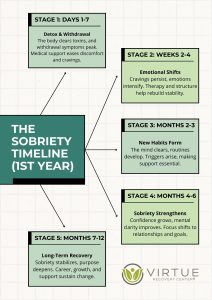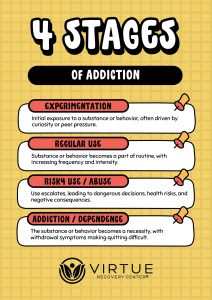Key Takeaways
- Addiction and self-esteem are closely intertwined, often forming a destructive cycle.
- Low self-esteem can lead to substance use, and addiction further erodes self-worth.
- Recovery programs are vital for restoring confidence and rebuilding self-esteem.
Introduction to Low Self-Esteem and Substance Abuse
Addiction is more than a physical dependency—it’s a condition that profoundly impacts emotional well-being. One of the most profound effects of substance abuse is on self-esteem, the way individuals perceive their worth. For those battling addiction, the feelings of guilt and shame can create a harmful cycle that worsens their sense of self.
This article explores how low self-esteem and addiction are connected, the ways addiction damages self-worth, and how recovery can help rebuild confidence and self-respect.
The Link Between Low Self-Esteem and Addiction
Low self-esteem doesn’t directly cause addiction, but it often sets the stage. When individuals struggle with feelings of inadequacy or worthlessness, they may turn to substances as a form of escape. Drugs and alcohol can offer temporary relief, numbing the pain or providing a fleeting sense of confidence.
Adolescents and young adults are especially vulnerable. Societal pressures, bullying, and academic stress can contribute to low self-worth. For example, a teenager who feels they aren’t “good enough” may experiment with substances to fit in or avoid emotional pain. Unfortunately, this coping mechanism can lead to dependency.
The National Institute on Drug Abuse notes that mental health challenges, including low self-esteem, are significant risk factors for substance abuse. This highlights the importance of addressing emotional struggles early to prevent addiction from taking hold.
How Addiction Impacts Self-Worth
Addiction doesn’t just harm the body; it takes a toll on the mind as well. People trapped in addiction often experience a cycle of guilt and shame. Each relapse or failed attempt to quit may feel like a personal failure, further diminishing self-esteem.
Damaged Relationships
Addiction can strain relationships with family and friends, leading to feelings of isolation. Loved ones may express frustration or disappointment, which can deepen the individual’s negative self-image.
Career and Financial Challenges
Substance abuse often disrupts professional and financial stability. Missing work, underperforming, or losing a job due to addiction can leave individuals feeling incapable and unworthy.
Physical and Behavioral Changes
The physical toll of addiction, such as weight changes or poor hygiene, can impact how someone views themselves. Behavioral changes, like lying or secrecy, further erode trust and self-respect.
Breaking the Cycle: Rebuilding Self-Esteem During Addiction Recovery
Recovery is more than just quitting substances—it’s about healing the whole person. Rebuilding self-esteem is a crucial part of this process.
Therapeutic Approaches During Addiction Treatment
Cognitive-behavioral therapy (CBT) helps individuals identify and challenge negative thought patterns. A therapist can guide someone to replace self-doubt with constructive self-talk and achievable goals.
Mindfulness Practices During Recovery From Addiction
Activities like meditation and journaling help individuals reconnect with themselves and develop a more positive self-image. Being present in the moment encourages self-acceptance and reduces feelings of inadequacy.
Setting and Achieving Goals in Addiction Treatment Programs
Small, measurable goals build confidence. For example, completing a 30-day sobriety milestone can boost self-esteem and motivate continued progress.
The Role of Community and Support in Healing
Recovery isn’t a journey anyone should face alone. Community support plays a vital role in boosting self-esteem.
Support Groups for Positive Self-Esteem
Groups like Alcoholics Anonymous or Narcotics Anonymous provide a safe space for individuals to share their experiences. Knowing they’re not alone fosters a sense of belonging and acceptance.
Positive Relationships
Surrounding oneself with people who uplift and encourage personal growth is critical. A strong support network reinforces the belief that individuals can overcome challenges.
Holistic Treatment
Programs that combine medical care, therapy, and community support create a nurturing environment for recovery. These approaches address both addiction and the underlying emotional wounds that contribute to low self-esteem.
Conclusion
Addiction and low self-esteem often go hand in hand, creating a cycle that can feel impossible to break. However, recovery offers hope and a path toward healing. By addressing the emotional toll of addiction and focusing on rebuilding self-worth, individuals can reclaim their lives and find fulfillment.
If you or a loved one is struggling with addiction and low self-esteem, help is available. Call Virtue Recovery Las Vegas at 866-520-2861 today to take the first step toward recovery.
FAQs
How does addiction start with low self-esteem?
Low self-esteem can lead people to use substances as a way to escape feelings of inadequacy, stress, or emotional pain.
Can addiction permanently damage self-esteem?
Addiction can harm self-esteem, but recovery programs and therapy can help rebuild confidence and self-worth over time.
Why is self-esteem important in addiction recovery?
Positive self-esteem motivates individuals to make healthy choices, sustain recovery, and resist relapse triggers.
What are the signs of low self-esteem?
Signs include self-doubt, feelings of worthlessness, avoiding challenges, and comparing oneself negatively to others.
How can therapy help improve self-esteem during recovery?
Therapy helps individuals identify and change negative thought patterns, set achievable goals, and build confidence through personal successes.
How can someone build up to achieve high self-esteem?
Building high self-esteem starts with practicing self-compassion, setting realistic goals, and celebrating small achievements. Developing positive self-talk and surrounding oneself with supportive people can reinforce confidence and self-worth.
What are the aspects of self-esteem that impact addiction?
Low self-esteem can lead individuals to seek validation or escape through substance use, increasing vulnerability to addiction. Conversely, fostering self-esteem through positive experiences and self-awareness can serve as a protective factor against addictive behaviors.
What are some causes of low self-esteem?
Low self-esteem can stem from childhood experiences like neglect, abuse, or excessive criticism. Negative self-perceptions may also arise from societal pressures, unmet expectations, or traumatic life events.
What modalities of treatment are there to improve behavioral health?
Treatment modalities for behavioral health include psychotherapy (cognitive-behavioral or dialectical behavior therapy), medication, and holistic approaches like mindfulness or art therapy. Community-based support groups and lifestyle interventions also play a significant role in recovery and wellness.
Resources
https://pmc.ncbi.nlm.nih.gov/articles/PMC3905528/
https://adf.org.au/talking-about-drugs/parenting-talk/teenagers/why-teenagers-use/













